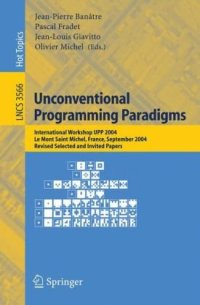
Ebook: Unconventional Programming Paradigms: International Workshop UPP 2004, Le Mont Saint Michel, France, September 15-17, 2004, Revised Selected and Invited Papers
- Genre: Computers // Programming
- Tags: Computation by Abstract Devices, Programming Languages Compilers Interpreters, Mathematical Logic and Formal Languages
- Series: Lecture Notes in Computer Science 3566 : Theoretical Computer Science and General Issues
- Year: 2005
- Publisher: Springer-Verlag Berlin Heidelberg
- Edition: 1
- Language: English
- pdf
Nowadays, developers have to face the proliferation of hardware and software environments, the increasing demands of the users, the growing number of p- grams and the sharing of information, competences and services thanks to the generalization ofdatabasesandcommunication networks. Aprogramisnomore a monolithic entity conceived, produced and ?nalized before being used. A p- gram is now seen as an open and adaptive frame, which, for example, can - namically incorporate services not foreseen by the initial designer. These new needs call for new control structures and program interactions. Unconventionalapproachestoprogramminghavelongbeendevelopedinv- iousnichesandconstituteareservoirofalternativewaystofacetheprogramming languages crisis. New models of programming (e. g. , bio-inspired computing, - ti?cialchemistry,amorphouscomputing,. . . )arealsocurrentlyexperiencinga renewed period of growth as they face speci?c needs and new application - mains. These approaches provide new abstractions and notations or develop new ways of interacting with programs. They are implemented by embedding new sophisticated data structures in a classical programming model (API), by extending an existing language with new constructs (to handle concurrency, - ceptions, open environments, . . . ), by conceiving new software life cycles and program executions (aspect weaving, run-time compilation) or by relying on an entire new paradigm to specify a computation. They are inspired by theoretical considerations (e. g. , topological, algebraic or logical foundations), driven by the domain at hand (domain-speci?c languages like PostScript, musical notation, animation, signal processing, etc. ) or by metaphors taken from various areas (quantum computing, computing with molecules, information processing in - ological tissues, problem solving from nature, ethological and social modeling).
Unconventional approaches to programming have long been developed, in various niches and out of curiosity, and they constitute a reservoir of alternative avenues to deal with unknown programming challenges. New paradigms of programming are currently experiencing a renewed period of interest and growth to cope with problems from specific application domains.
This book constitutes the thoroughly refereed post-proceedings of the International Workshop on Unconventional Programming Paradigms, UPP 2004, held at Le Mont Saint Michel, France, in September 2004. The 26 revised full papers presented together with an invited paper on quantum computing were carefully reviewed for presentation in the book. The papers are organized in topical sections on chemical computing, amorphous computing, bio-inspired computing, autonomic computing, and generative programming.